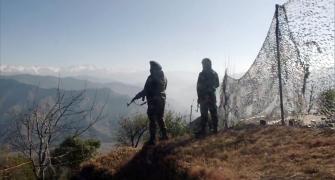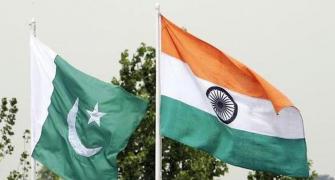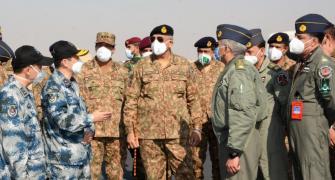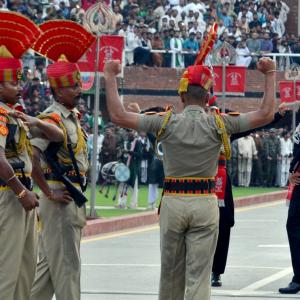'Under National Security Advisor Ajit Kumar Doval and now Chief of Defence Staff General Bipin Rawat, India began to actively work on Pakistani internal faultlines with a possibility of the break-up of Pakistan as the only solution,' observes Colonel Anil A Athale (retd).

India-Pakistan relations have seen so many false dawns that most analysts had come to a conclusion that the roller coaster nature of these relations will never change.
But this time around after the agreement to observe the 2003 ceasefire on the LoC, there seems glimmer of hope.
There are several reasons for this.
For starters, this time the initiative from Pakistani side seems to have come from the Pakistan army, note Pakistan army chief General Qamar Javed Bajwa's statement that it is time for India and Pakistan to bury the hatchet.
India being the status quo power (notwithstanding the periodic statement laying claim to Pakistan occupied Kashmir and Gilgit Baltistan) was always ready to change the relationship from conflict to co-existence.
But all this while Pakistan believed that through break-up of India it would be able to achieve its dream of annexing Jammu and Kashmir.
Pakistan also regarded this as not merely a territorial conflict, but an ideological one between the philosophy of Pakistan that claims loyalties of all Muslims of the subcontinent.
Half a century of existence of another Muslim majority State, Bangladesh, on the subcontinent had dented this ideology, but had never really ended it.
Thus, there was an asymmetry between the Indian and Pakistani approach.
For India, Kashmir is a territorial dispute (realistic conflict) while for Pakistan it is an ideological issue.
Literature on conflict resolution is full of such instances wherein while a 'realistic' conflict can be resolved through negotiations and give and take, in case of ideological conflict, only a maximalist solution is possible/acceptable.
This led to Pakistan viewing its relations with India as a 'zero sum game' (every loss of the opponent's is an equal gain for self).
There have been exceptions to this rule when Pakistan co-operated in dealing with the threat of locusts or water sharing under the Indus wWater treaty.
Manifestation of this lingering mindset was seen recently when even sugar and cotton imports from India, that are clearly in Pakistani economic interests, were opposed and had to be backtracked.
Although it seems likely that as soon as the dust settles, imports will be quietly resumed, as in case of medicines.
A realisation seems to have finally dawned on Pakistan that its goal of a break-up of India is unattainable and is only bankrupting Pakistan.
Another reason for the re-think in the Pakistani army is the change of Indian strategy since the advent of the Modi government.
After having unsuccessfully tried to mend fences with Pakistan (the surprise December 25, 2015 visit to then Pakistan prime minister Nawaz Sharif's Lahore home), the Modi government has changed India's strategy towards Pakistan from offensive defence to one based on offense where India began to actively work towards disintegration of Pakistan.
Gone were the days when India often stated that a united and peaceful Pakistan is in the Indian interest.
In its place, under National Security Advisor Ajit Kumar Doval and now Chief of Defence Staff General Bipin Rawat, India began to actively work on Pakistani internal faultlines with a possibility of the break-up of Pakistan as the only solution.
This was backed up by a 'live' LoC and doctrine of hot pursuit in case of attacks by Pakistan-based terrorists.
Despite its propaganda, Pakistan is also deeply disappointed with the fact that India was able to crush the unrest in the Kashmir valley without too much bloodshed.
The lack of Kashmiri resistance has come as a great disappointment to the Pakistan establishment.
The rest of the world's indifference to India's Kashmir crackdown has further disheartened Pakistan.
But in the final analysis, jeopardising Pakistan's security and wellbeing for the sake of the 'liberation' of Kashmir is something that has forced the Pakistani hand.
Even earlier General Pervez Musharraf had posed this very question and come round to seeking a modus vivendi with India. History seems to repeat itself.
The looming new Cold War between the US and China has left Pakistan with a Hobson's choice.
Pakistan's rise on the geopolitical map of the world and even its nuclear weapons owe its existence to the Sino-US alliance of the 1980s and the 1990s.
Now that America and China have drifted apart, Pakistan is in a dilemma. It cannot do without US and Western economic aid and needs China's military help to contain India.
This running with the hares and hunting with the hounds policy is no longer feasible.
Thoughtful Pakistanis are also concerned about the Chinese 'debt trap' a la Sri Lanka and possible loss of national sovereignty.
A model to solve a Kashmir-like dispute exists in the Irish Accord between Ireland and the UK.
Soft borders, internal autonomy and enhanced economic links are the foundations on which this 800-year-old dispute was resolved.
This has been proposed by many -- including me at a World Peace Congress in Melbourne in December 1998 -- but has always foundered on the rock of domestic opposition.
The Kashmir issue has made sections of the populations of India and Pakistan toxic, who view each other as arch enemies.
In addition, there is the baggage of history of the depredations by Mughal rulers like Aurangzeb, with whom Pakistanis identify.
Yet if a slow and determined effort is made, there is enough goodwill amongst the people of both countries of a shared culture, language and ethnicity that can be encouraged to deal with hardliners on both sides.
Military historian Colonel Anil A Athale (retd) is a former Chhatrapati Shivaji Chair Fellow at the United Services Institute of India.
Feature Presentation: Aslam Hunani/Rediff.com










